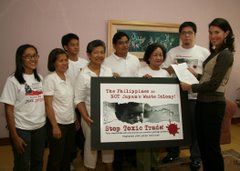
Photo by Gigie Cruz/GAIA.
Nurses, students call for junking JPEPA,
say they’re not tradable goods

Saying they are not tradable goods to be exported cheaply to Japan, some two hundred nurses and nursing students trooped today to the Senate to protest the Japan-Philippines Economic Partnership Agreement (JPEPA), which the senators are discussing for the fourth in a series of pre-ratification hearings.
Dean Edward Malzan of the College of Nursing of Colegio de San Lorenzo in Quezon City, spokesperson for the Philippine Nurses Association (PNA), said that the nurses and nursing students are taking issue with what they see as inequitable and insecure terms under which Filipino nurses would be allowed to work in Japan through a preferential trade agreement.
Photo by Gigie Cruz/GAIA.
 “JPEPA is primarily an agreement to facilitate the movement of tradable goods,” said Malzan. “But nurses are people whose welfare and security we need to consider before we send them abroad.”
“JPEPA is primarily an agreement to facilitate the movement of tradable goods,” said Malzan. “But nurses are people whose welfare and security we need to consider before we send them abroad.”
Malzan said that the JPEPA left out essential labor safeguards for the practice of Filipino nurses in Japan. Filipino nurses are very likely to end up as mere trainees and be integrated into Japan’s notorious trainee system, under which foreign workers perform equal work as Japanese nationals but receive significantly lesser pay.
Under the JPEPA, a Filipino nurse who has passed the Philippine Licensure Exam and has three years of work experience is qualified to go to Japan, but has to undergo six months of language training in Japan. He or she will also be given three years to hurdle the licensure exam in Japanese while training under the supervision of a Japanese nurse. Failure in passing the Japanese exam means the Filipino nurse would have to go back to the Philippines.
In a protest tableau, the protesters showed a group of nurses closely packed into a wooden crate labeled “JPEPA EXPORT TO JAPAN: FOR ABUSE AND EXPLOITATION.”
At the same time the protesters were picketing the Senate gates, Leah Paquiz, president of the PNA, was testifying during the hearing being conducted by the Committee on Foreign Relations to discuss the provisions of the JPEPA relating to the movement of natural persons.
 In a statement delivered to the Senate, Paquiz said that the unnecessarily stringent requirements of the JPEPA will effectively relegate the Filipino nurse as a contractual second-class trainee in Japan, with a status inferior to that of a Japanese nurse.
In a statement delivered to the Senate, Paquiz said that the unnecessarily stringent requirements of the JPEPA will effectively relegate the Filipino nurse as a contractual second-class trainee in Japan, with a status inferior to that of a Japanese nurse.She lamented the fact that Japan gave better terms to Indonesian nurses in the Japan-Indonesia Economic Partnership Agreement (JIEPA). Under the JIEPA, an Indonesian nurse with only three years of professional education and with only two years of work experience is qualified to go to Japan. In contrast, a Filipino nurse is required four years of professional education and three years work experience to qualify under the JPEPA.
“In our opposition to the JPEPA, we are fighting for the dignity and professionalism of the Filipino nurse. The Filipino nurse is just as competent as her Japanese and Indonesian peers. If Japan truly needs our services, then it must give us the same treatment and professional courtesy that we get from the rest of the world,” added Dr. Paquiz.
Paquiz added that even the Japanese Nursing Association (JNA) itself vigorously opposes the entry of Filipino nurses abroad. “Why should we insist on going to a place where we are not wanted when there are other countries where we are wanted and that offer more attractive compensation?” asked Paquiz.
The JNA in an official statement earlier said that there is no shortage of nurses in Japan and that the Japanese government must first address the problems of the nursing industry there before allowing the entry of foreign nurses.
More photos:
All photos by Gigie Cruz/GAIA.













No comments:
Post a Comment